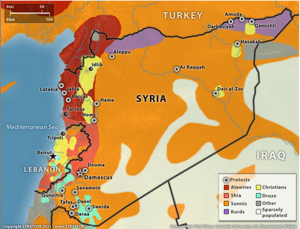
Sects
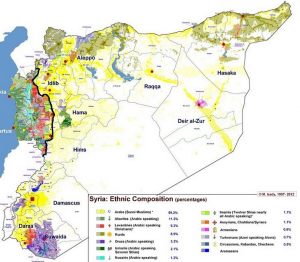
Ethnicity
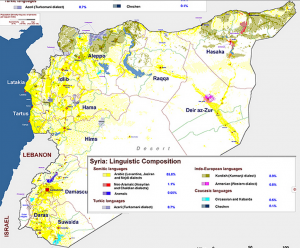
Languages
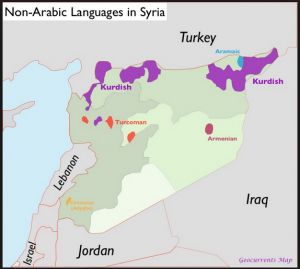
Non-Arab Languages
Source: Neal Rauhauser “Syrian Sects & Ethnic Groups“

Sects

Ethnicity

Languages

Non-Arab Languages
Source: Neal Rauhauser “Syrian Sects & Ethnic Groups“

OpenTopic is a news curation service which allows you to aggregate, monitor and filter any number of sources and to publish and share your selected ones to you selected outlets: from your WordPress site, to your social media channels and to your email newsletter engine. Within OpenTopic you can create one or more “Topic” dashboards. These are essentially display pages that aggregate incoming fresh content from the sources you specify. You can jump from one Topic dashboard to the next at the click of your mouse. To curate stories you simpy select the ones that are relevant to your audience and you are provided with an editing module to modify and personalize the story content. At this point you can also select on which one of your outlets (Channels) that story will be published and you can customize the story differently for each one of them. There is even an option that allows you to set-up some form of automated curation, by giving you the option to set up a set of simple rules, which when match, will trigger the publishing of a news story. OpenTopic allows you to hook up to an extended number of possible Channels, making it easy for you to post from one location to your web site, RSS feed, social media and newsletter. Last but not least, OpenTopic integrates a full analytics service, capable of reporting and showcasing the performance of your curation work across stories and distribution channels. My comment: Excellent tool for social media and community managers, as well as web marketing specialists in need to support effectively the finding of relevant news on a topic and the easy publishing to different channels from a centralized platform. Easy to use.
Request an invite here: opentopic
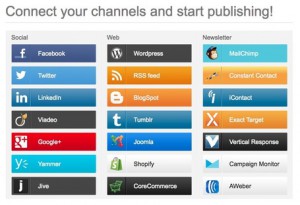

From citizentekk.com – June 13, 3:16 PM
Commodity money was first—gold, precious metals, things considered inherently valuable. Next came political money—fiat currency, banknotes, things that had value because they were backed by governments and legal systems. Now there’s math-based money—money controlled only by protocols and algorithms. Harnessing and maximizing the power and potential of these new math-based systems is going to be the big story in finance for decades to come.
The Future of Money and Bitcoin by Chris Larsen, CEO of OpenCoin – citizentekk –
EXTRACT:
Continue reading “Jean Lievens: Chris Larsen on The Future of Money and BitCoin”

Dear Friends and Colleagues:
George thought you might be interested in the op-ed below published today by Guinean President Alpha Condé. President Condé writes about the struggle to reform business practices in Guinea’s mining sector so all the people of Guinea can benefit from the country’s immense mineral wealth. The op-ed comes in the context of Conde’s participation in this year’s G8 meeting, which is focusing on trade, taxes, and transparency. OSF has been in the forefront of promoting transparency particularly in the governance of natural resources. President Condé is emerging as a champion of these values in Africa. His op-ed is an elegant statement of why the issue is so vital to the continent’s development.
Best regards,
Michael Vachon

In Guinea we want our resource wealth to work for all the people.
We need G8 support for transparency and good global business governance so that our assets can be used to benefit everyone rather than just a few greedy mining companies and politicians.
In December 2010, I was elected president of Guinea in its first truly open and democratic elections. I said then that I had inherited a country, not a state. Our economy was in ruins, our people among the poorest on the planet and our political system weakened by decades of corruption, dictatorship and misrule.
It needn't be so. Guinea has vast mineral wealth, the world's largest reserves of bauxite and some of the highest grade iron ore deposits.
Making these assets work for all our people rather than a few unscrupulous international mining companies and politicians means confronting the deeply ingrained corruption in our politics and business. But uprooting such corruption can be painfully slow, and is often dangerous. After all, vested interests do not welcome challenge.
Continue reading “George Soros Recommends Alpha Conde President of Guinea on Transparency”
Digital Grab: Corporate Power Has Seized the Internet
Norman Solomon
Ethical Technology
Posted: Jun 14, 2013
If your daily routine took you from one homegrown organic garden to another, bypassing vast fields choked with pesticides, you might feel pretty good about the current state of agriculture. If your daily routine takes you from one noncommercial progressive website to another, you might feel pretty good about the current state of the Internet. But while mass media have supplied endless raptures about a digital revolution, corporate power has seized the Internet—and the anti-democratic grip is tightening every day.
“Most assessments of the Internet fail to ground it in political economy; they fail to understand the importance of capitalism in shaping and, for lack of a better term, domesticating the Internet,” says Robert W. McChesney in his illuminating new book, Digital Disconnect.
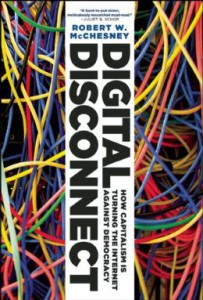
Plenty of commentators loudly celebrate the Internet. Some are vocal skeptics. “Both camps, with a few exceptions, have a single, deep, and often fatal flaw that severely compromises the value of their work,” McChesney writes. “That flaw, simply put, is ignorance about really existing capitalism and an underappreciation of how capitalism dominates social life. . . . Both camps miss the way capitalism defines our times and sets the terms for understanding not only the Internet, but most everything else of a social nature, including politics, in our society.”
And he adds: “The profit motive, commercialism, public relations, marketing, and advertising — all defining features of contemporary corporate capitalism — are foundational to any assessment of how the Internet has developed and is likely to develop.”
Concerns about the online world often fixate on cutting-edge digital tech. But, as McChesney points out, “the criticism of out-of-control technology is in large part a critique of out-of-control commercialism. The loneliness, alienation, and unhappiness sometimes ascribed to the Internet are also associated with a marketplace gone wild.”
Discourse about the Internet often proceeds as if digital technology has some kind of mind or will of its own. It does not.
For the most part, what has gone terribly wrong in digital realms is not about the technology. I often think of what Herbert Marcuse wrote in his 1964 book One-Dimensional Man: “The traditional notion of the ‘neutrality’ of technology can no longer be maintained. Technology as such cannot be isolated from the use to which it is put; the technological society is a system of domination which operates already in the concept and construction of techniques.”
Phi Beta Iota: Put quite simply, Open Source Everything (OSE) and the Autonomous Internet are the foundations for liberty in a digital world.
See Also:

This new app turns iPhones into a handheld biosensor equivalent to $50,000 lab unit
This portable biosensor is capable of detecting viruses, bacteria, proteins, toxins, and other specific modules, and takes just a few minutes to process, which could greatly speed up in-the-field assessments of issues as diverse as groundwater contamination, medical diagnostics, mapping the spread of pathogens, or tracking contaminants in the food system.
Danger Maps crowd-sources environmental contamination in China
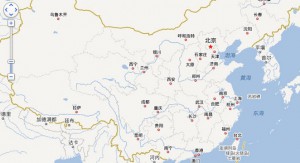
China's pollution problems are widespread, recently becoming the number one cause of social unrest in the country.
A new site called Danger Maps is harnessing the power of crowd-sourcing to identify polluted locations, such as waste treatment facilities, garbage dumps and oil refineries. The site was started by Liu Chunlei after he discovered that his Shanghai apartment is near a landfill, something that was not disclosed when he made his purchase.
Bloomberg reports that the internet is becoming an important tool for activists in China:
“More Internet users are starting to understand how important information and data can be for sustainable social activism,” said Isaac Mao, director of the Social Brain Foundation, a social incubator for Chinese grassroots culture. “Visual sites are very helpful for the public to understand the big picture.”
Continue reading “Eagle: Toward the Internet of Pro-Active Hand-Held Sensors”

Internet Phases: Past, Present, and Future
Jeremiah Owyang
web-strategist.com, 11 June 2013
Thanks to you, last week’s report on the collaborative economy was readily received, and has been viewed over 26k times, the media picked up on it, and bloggers alike. As we digest what it means, it’s important to recognize this is the next phase in the internet, and the next phase of social business. An interesting finding is that the second era (social) and the third era (collaborative economy), use the same technologies (social technologies) but instead of sharing media and ideas –people are sharing goods and services. This is all part of a continuum and we need to see our careers progress as the market moves forward with us.
[Social technology enabled the sharing of media and ideas called social business –the same tools enable sharing of goods and services called the collaborative economy]
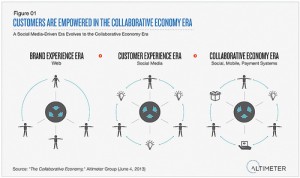
| Attribute | Brand Experience Era | Customer Experience Era | Collaborative Economy Era |
| Driving technology | CMS and HTML | Social Technologies | Social Technologies |
| Years | 1995: Internet had 14% american adoption | 2005: Business blogging disrupted corporations | 2013: AirBnb, TaskRabbit, Lyft, gain mainstream attention |
| What is shared | Vetted Information | Personal Ideas and Media | Goods and Services |
| Who shares | Few | Many | Many |
| Who receives | Many | Many | Many |
| What it looks like | Brands and media talk, people listen | Everyone talks and listens | Buy once, share many, need to buy less |
| Who has the power | Brands and publishers | Those who use social | Those who share goods and services |
| Who is disrupted | Traditional mediums: TV, Print | Corporations, governments | Corporations, governments |
| What must change | Media models | Communication and marketing strategy | Business models |
| How corporations responded | Created their own corporate website | Adopted social tools internally, externally | Learn to share products, enable marketplace |
| Software needed | CMS and design tools | SMMS, monitoring, communities | Marketplace, ecommerce, communities, SMMS, Monitoring |
| Services needed | User Experience, Design, Content | Social strategy, community managers, communicators | Agencies that help with trust, customer advocates, ? |
| Who wins | Those who adopt | Those who adopt | Those who adopt |
What it means to your career, clients, and company:
Continue reading “Jean Lievens: Internet Phases: Past, Present, and Future”